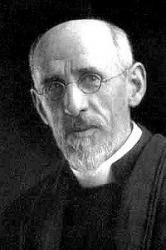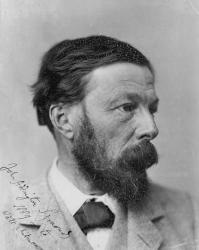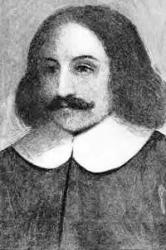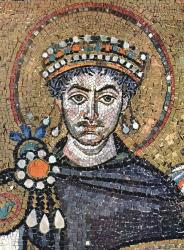Planning worship?
Check out our sister site, ZeteoSearch.org,
for 20+ additional resources related to your search.
- |
User Links
Person Results
Cyril Alington

1872 - 1955 Person Name: Cyril Argentine Alington Author of "Lord, thou hast brought us to our journey's end" in Hymnal for Colleges and Schools Educated at Trinity College, Oxford, England, Cyril A. Alington (b. Ipswich, England, 1872; d. St. Leonards, Hertfordshire, England, 1955) was ordained a priest in the Church of England in 1901. He had a teaching career that included being headmaster at Shrewsbury School and Eton College. He was dean of Durham from 1933-1951 as well as chaplain to the king of England. His writings include literary works and Christianity in England, Good News (1945). Many of his hymns appeared in various twentieth-century editions of the famous British hymnal, Hymns Ancient and Modern.
Bert Polman
Cyril Alington
Elizabeth Lee Smith
1817 - 1898 Person Name: Elizabeth L. Smith, 1817-1898 Translator of "I Greet Thee, Who My Sure Redeemer Art" in Pilgrim Hymnal Smith, Elizabeth Lee, née Allen, daughter of Dr. W. Allen, President of Dartmouth University, was born in 1817, and married in 1843 to Dr. H. B. Smith, who became Professor in Union Theological Seminary, New York, in 1850, and died in 1877. Mrs. Smith's hymns, including translations of "Je Te salue", “O Jesus Christus", are in Schaff's Christ in Song, 1869 and 1870. [Rev. F. M. Bird, M.A.]
--John Julian, Dictionary of Hymnology (1907)
According to the Canterbury Dictionary of Hymnology, Elizabeth Lee Smith passed away in 1898.
"Elizabeth Lee Smith." The Canterbury Dictionary of Hymnology. Canterbury Press. Web. 19 Apr. 2018. http://www.hymnology.co.uk/e/elizabeth-lee-smith.
Elizabeth Lee Smith
Robert Dobbie
1901 - 2001 Author of "Eternal Father, Lord Of Space And Time" in The Hymn Book of the Anglican Church of Canada and the United Church of Canada Dobbie, Robert. (Dundee, Scotland, March 12, 1901- ). Congregational/United Church. Glasgow University, B.A., 1924, B.D., 1927; University of London, external B.D.'s in Old Testament subjects, 1934, 1938; M.Th., 1940. Pastorates in Scotland at Dunfermline, 1927-1936; Cambusland, 1936-1941; Ardroffan, 1941-1946. Lecturer or professor in Old Testament at Glasgow University, 1946-1947; St. Andrew's University, 1947-1955; Emmanuel College, Toronto, 1955-1969; Carleton University, Ottawa, 1969-1974. In 1974, he semi-retired to Chatham, Ontario. Despite longstanding interest in hymns, he began only late in life to write them.
--Hugh McKellar, DNAH Archives
Robert Dobbie
T. A. Lacey

1853 - 1931 Person Name: Thomas A. Lacey Translator (from Greek) of "O Word Immortal of Eternal God" in The Cyber Hymnal Lacey, Thomas Alexander, s. of G. F. Lacey, was b. at Nottingham, Dec. 20, 1853. He entered Balliol Coll., Oxford, as an exhibitioner in 1871 (B.A. 1876, M.A. 1885), was ordained D. 1876, P. 1879, was from 1894 to 1903 Vicar of Madingley near Cambridge, and since then has been Chaplain of the London Diocesan Penitentiary. He was one of the Committee who compiled The English Hymnal, 1906, and contributed to it twelve translations (8, 66, 67, 69, 104, 123, 124, 174, 208, 226, 249, 325), also one unpublished and one previously published original, viz.,
1. O Faith of England, taught of old. [Church Defence.]
2. The dying robber raised his aching brow. [Good Friday.] First in the Treasury, Sept. 1905, p. 482, headed "Sursum."
Three other translations by him are noted at pp. 989, i. 1139, ii. [Rev. James Mearns, M.A.]
--John Julian, Dictionary of Hymnology, New Supplement (1907)
T. A. Lacey
John Addington Symonds

1840 - 1893 Person Name: J. Addington Symonds, 1840-93 Author of "To God, the everlasting, who abides" in Songs of Praise Symonds, John Addington, M.A., s. of J. A. Symonds, b. at Bristol, Oct. 5, 1840; educated at Harrow, and Balliol College, Oxford, B.A. (double first) 1862, and Fellow of Magdalen 1862. Wrote extensively, especially on the History of the Italian Renaissance, and also published various volumes of verse. Died at home, April 19, 1893. His Life, by Horatio Brown, was published in 1895. His hymn: "These things shall be! a loftier race" (A Regenerated World), in The Methodist Hymn Book, 1901, is from his New and Old, a volume of verse by John Addington Symonds, 1880, p. 225. It begins with st. iv. of "Sad heart, what will the future bring?" a poem entitled "A Vista." [Rev. James Mearns, M.A.]
--John Julian, Dictionary of Hymnology, New Supplement (1907)
John Addington Symonds
F. M. Owen
1842 - 1883 Person Name: Frances M. Owen, 1842-1883 Author of "Lighten the Darkness" in Pilgrim Hymnal Frances Mary Owen, née Synge, wife of the Rev. J. A. Owen, Assistant Master at Cheltenham College, was born April 16, 1842, and died June 19, 1883.
--John Julian, Dictionary of Hymnology, Appendix, Part II (1907)
F. M. Owen
W. B. Bradford

1589 - 1657 Person Name: William Bradford Author of "And Truly It Is a Most Glorious Thing" in The Cyber Hymnal Born in 1590, William Bradford was one of the founders of Plymouth colony in 1620 and a signer of the Mayflower Compact. He served as the colony's governor for more than thirty years, and wrote "Of Plymouth Plantation," one of the first histories of European settlement in the New World, before his death in 1657.
Born of substantial yeomen in Yorkshire, England, Bradford expressed his nonconformist religious sensibilities in his early teens and joined the famed Separatist church in Scrooby at the age of seventeen. In 1609 he immigrated with the congregation, led by John Robinson, to the Netherlands. For the next eleven years he and his fellow religious dissenters lived in Leyden until their fear of assimilation into Dutch culture prompted them to embark on the Mayflower for the voyage to North America.
The Pilgrims arrived in what became Plymouth, Massachusetts, in 1621 with a large number of non-Separatist settlers. Before disembarking, the congregation drew up the first New World social contract, the Mayflower Compact, which all the male settlers signed.
Bradford served thirty one-year terms as governor of the fledgling colony between 1622 and 1656. He enjoyed remarkable discretionary powers as chief magistrate, acting as high judge and treasurer as well as presiding over the deliberations of the General Court, the legislature of the community. In 1636 he helped draft the colony's legal code. Under his guidance Plymouth never became a Bible commonwealth like its larger and more influential neighbor, the Massachusetts Bay Colony. Relatively tolerant of dissent, the Plymouth settlers did not restrict the franchise or other civic privileges to church members. The Plymouth churches were overwhelmingly Congregationalist and Separatist in form, but Presbyterians like William Vassal and renegades like Roger Williams resided in the colony without being pressured to conform to the majority's religious convictions.
After a brief experiment with the "common course," a sort of primitive agrarian communism, the colony quickly centered around private subsistence agriculture. This was facilitated by Bradford's decision to distribute land among all the settlers, not just members of the company. In 1627 he and four others assumed the colony's debt to the merchant adventurers who had helped finance their immigration in return for a monopoly of the fur trading and fishing industries. Owing to some malfeasance on the part of their English mercantile factors and the decline of the fur trade, Bradford and his colleagues were unable to retire this debt until 1648, and then only at great personal expense.
Around 1630 Bradford began to compile his two-volume Of Plymouth Plantation, 1620-1647, one of the most important early chronicles of the settlement of New England. Bradford's history was singular in its tendency to separate religious from secular concerns. Unlike similar tracts from orthodox Massachusetts Bay, Bradford did not interpret temporal affairs as the inevitable unfolding of God's providential plan. Lacking the dogmatic temper and religious enthusiasm of the Puritans of the Great Migration, Bradford steered a middle course for Plymouth Colony between the Holy Commonwealth of Massachusetts and the tolerant secular community of Rhode Island.
--www.history.com/topics/william-bradford
W. B. Bradford
Justian I

483 - 565 Person Name: Emperor Justinian, 483-565 Author of "O Word Immortal of Eternal God" in The Cyber Hymnal Saint Justinian, a major figure in the history of the Byzantine state, was also a great champion of Orthodoxy, a builder of churches and a Church writer. He is said to be of Slavic descent, perhaps born in Bulgaria. During his reign (527-565) Byzantium won glory with military victories in Persia, Africa, Italy, as a result of which paganism was decisively routed among the Germanic Vandals and Visigoth tribes. By command of the emperor Justinian the pagan schools in Athens were closed. Justinian sent John, the Bishop of Ephesus, throughout the regions of Asia Minor with the aim of spreading Christianity. John baptized more than 70 thousand pagans.
The emperor gave orders to build ninety churches for the newly-converted, and he generously supported church construction within the Empire. His finest structures of the time are considered to be the monastery at Sinai, and the church of Hagia Sophia at Constantinople. Under St Justinian many churches were built dedicated to our Most Holy Lady Theotokos. Since he had received a broad education, St Justinian assiduously concerned himself with the education of clergy and monks, ordering them to be instructed in rhetoric, philosophy and theology.
The right-believing sovereign devoted much attention and effort to the struggle with the Origenists of his time, who then were reviving the Nestorian heresy. To counter their heretical speculations, the Church hymn “Only-Begotten Son and Immortal Word of God, Who for our salvation...” was composed, and Justinian commanded that it be sung in the churches. From that time to the present day, this hymn is sung at the Divine Liturgy before the Small Entrance after the second Antiphon.
At the command of the sovereign, the Fifth Ecumenical Council was convened in the year 553, censuring the teachings of Origen and affirming the definitions of the Fourth Ecumenical Council at Chalcedon. He also attempted to secure religious unity within the Empire through his (unsuccessful) dialogues with the non-Chalcedonians.
The holy Emperor Justinian wished to have orderly rule and law within the realm. Under his guidance and supervision a complete compendium of Roman law was compiled. It has come down to us as a law codex known as “the Justinian Codex.” The “Church laws” of Justinian are included in all the variants of the Russian collections of Canon Law.
In his personal life, St Justinian was strictly pious, and he fasted often. During Great Lent he would not eat bread nor drink wine. He is also remembered for promoting the idea of “symphony” between church and state. The holy Emperor Justinian died in the year 565.
The Empress Theodora, who died in the year 548, was also numbered among the saints with her husband. She was at first a notorious harlot and actress, and an adherent of the Monophysite heresy, but then she repented. After becoming empress, she led a virtuous life, maintaining purity of both soul and body. She provided wise counsel for her husband during his reign, and she also saved his throne during the Nika riots of 532 by her political intelligence and expertise.
--oca.org/saints/lives
Justian I
Michael Paget
1936 - 1994 Person Name: Michael Paget, 1936- Additional parts and descant of "SONG 24" in The Cambridge Hymnal
Michael Paget
Julie Tennent
Author of "O LORD, My God, in You I Refuge Take" in Psalms and Hymns to the Living God
Julie Tennent


 My Starred Hymns
My Starred Hymns


